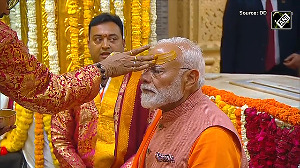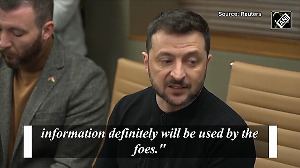Under her black burqa, she wears a black printed 'nighty'; her hands are henna-ed, her ankles are adorned with heavy silver jhanjars.
She has a plump, pleasant face and a strapping body; she looks like one of the millions of ordinary housewives you see bustling around on Mumbai's streets.
Neither 'ordinary', nor 'housewife', are words that apply to Fahmida Mohammed Hanif, the 37-year-old mother of three who, last week, got into a cab with her husband and two of her children, and a lethal cargo of 25 kilos of gelatin, wired up to a ticking timer.
Her seeming ordinariness, says Assistant Commissioner of Police Suresh Walishetty -- a member of the team that led the investigation into the Mumbai bomb blasts of August 25 -- is dangerously deceptive.
At the time of her arrest, says Walishetty, she evinced no regret; rather, she said she had done what she did for the sake of her 'kaum' (community).
What she did was assemble the weapons of destruction. From her 100 square-foot room in Chiman Pada, a Muslim-dominated locality in suburban Andheri, she helped her husband put together detonators and 'time bombs', before setting out with her family to plant the lethal payload.
The story of the investigation that led to her arrest is a study in patience.
As soon as Shivnarayan Pande, the taxi driver whose vehicle was used in the blast and who survived the explosion, told police that he had picked up the family from Chiman Pada, Mumbai crime branch officers were posted in that area.
Police artists quickly prepared the sketches of the suspects, based on Pande's recollections; they were then passed around in Chiman Pada as crime branch officials tapped their sources looking for leads.
One informant came forward to tell the police that he had seen Arshad -- an expert in zari-embroidery -- with the couple; he said the three of them were carrying huge bags.
The informant led the police to 'Juhu gully', in Andheri West, and pointed out the home of Arshad. Police embarked on a vigil that was to last 36 hours, before their quarry walked into the net.
Arshad, in turn, gave up the names of Hanif and Fahmida -- but when police landed up at their address to affect the arrest, they found that a resident of the neighbourhood had died; the situation was hardly conducive to making an arrest.
Members of the police team, disguised as Muslims, joined the funeral procession; others fanned out across the neighbourhood in disguise. They waited for the funeral to end and for the mourners to disperse. Then, at what they deemed the appropriate moment, they arrested the couple.
At the time of the arrest, the police also found Fahmida and Hanif's grown-up son; investigating officials say he had quarrelled with his parents and was not involved in the destruction.
He has since been taken out of Chiman Pada, under police security, to prevent his being harmed by a backlash.
Fahmida's interrogation has yielded much information. She told the police how, on July 28, she twice boarded BEST buses in Ghatkopar only to discover that the back seats were occupied; it was only on her third attempt that she found space at the rear of the bus.
She planted her bomb, got off at the next stop, Marol, and returned home; the bomb later exploded at Ghatkopar, killing four persons and injuring 31.
Fahmida told the police that since she and her husband were not suspected after the July 28 blasts, she felt it was safe to remain in their home even after the more lethal August 25 blasts.
"Hanif has served once in the King's palace in Saudi Arabia," Walishetty said. "When the Gujarat riots happened, he was in Dubai serving in Hilton Hotel. He was attending prayers at a mosque in Dubai, and heard and was brainwashed by the anti-Gujarat and anti-India speeches of the maulvis.
"He was persuaded by some Pakistanis, and an Indian who is based in Mumbai and Dubai, to leave the job and return to Mumbai; they assured him of money and protection.
"On arriving in Mumbai, he started plying a three-wheeler, and was also making bombs at home with the help of Fahmida."
Fahmida told police that she took telephone messages from Dubai, and also from another operator who, she said, provided them with the raw materials needed to make the bombs.
Walishetty is certain that the police has all the evidence it needs to nail the couple, especially Fahmida.
"There is no chance that she is innocent," the senior police official says. "We will make a fool-proof case against her. A woman who could even involve her 18-year-old daughter in her crime must not go scot-free."
Hanif's accomplice in crime, Arshad, similarly told police that at the time of the 2002 Gujarat riots, he was in Surat. "Apna matha fir gaya, atyachar dekh kar (My head turned, on seeing the atrocities), he told the police.
The Indian who helped recruit Hanif, and the operator who helped Hanif and Fahmida get raw materials for their bombs, are absconding.






 © 2025
© 2025